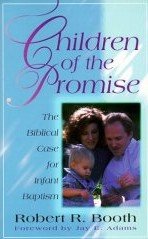
At the end of my first year in seminary, Big Red and his family moved into our apartment complex, which allowed us to continue our theological conversations on a much more regular basis. During one of our talks, I spied a book on Red’s desk called Children of the Promise by Randy Booth. To my shock and horror, the subtitle was The Biblical Case for Infant Baptism. What an oxymoron! I knew that there was absolutely no Biblical evidence for baptizing infants. This was a tradition left over from Rome.
I made no mention of this to Red, but I immediately procured the book from The Master’s library. I read it with extreme skepticism. I doubted every assertion and quibbled over every point of his exegesis, but after reading the book, I knew I was in serious trouble. I was far from convinced, but for the first time, I had to acknowledge that there was a legitimate Biblical argument for infant baptism.
I had always approached baptism as an independent issue. Booth’s book helped me understand that baptism is largely determined by the relationship between Israel and the church. Baptism is a symptom of ecclesiology.
For the next couple of years, I wrestled with the issue of Israel and the church. During this time I read through the Bible multiple times, always with an eye towards understanding the relationship between Israel and the church. I paid careful attention to Genesis 12-17, Romans 9-11, Galatians 3-4, Hebrews 8-10, as well as hundreds of other related passages. I began to come to the conclusion that the church is a continuation of what God began with Abraham (and ultimately with Adam).
When I came to reject a hard distinction between Israel and the church, my dispensational house of cards toppled. However, I did not immediately jump to a covenantal view. I made a pit stop in New Covenant Theology, a Reformed Baptist sect of recent origin.




